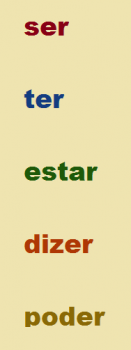[10 most important verbs in Portuguese] Part I Posted by carol on Apr 25, 2017 in Grammar, Learning, Vocabulary
[Os dez verbos mais importantes em Português] Parte I
Olá, gente! Hello, everyone!
To become fluid in Portuguese, learning verbs is a major part of your learning. To help you out, I have made a selection with the ten most important verbs in Portuguese. Below you can find a list with our most frequently used verbs, their conjugation in the present tense and some examples.
Divirtam-se! Have fun!

- SER – TO BE
eu sou
você é
ele/ela é
nós somos
vocês são
eles/elas são
- A esposa dele é médica (His wife is a doctor)
- Elas são gêmeas (They are twins)
- Nós somos seus novos vizinhos (We are your new neighbors)
2. TER – TO HAVE
eu tenho
você tem
ele/ela tem
nós temos
vocês têm
eles/elas têm
- Eu tenho boas notícias (I have good news)
- Nós temos três filhos (We have three children)
- O Brasil tem uma população de mais de duzentos milhões de pessoas (Brazil has a population of over 200 million people)
- Vocês têm um liquidificador para me emprestar? (Do you have a blender to lend me?)
- Os jogadores de futebol no Brasil têm ótimos salários (Soccer players in Brazil have great salaries)
3. ESTAR – TO BE
eu estou
você está
ele/ela está
nós estamos
vocês estão
eles/elas estão
- Você está ocupado? (Are you busy?)
- Onde vocês estão? (Where are you?)
- Nós estamos em casa (We are home)
- O ônibus está partindo (The bus is leaving)
4. DIZER – TO SAY
eu digo
você diz
ele/ela diz
nós dizemos
vocês dizem
eles/elas dizem
- O que você tem para dizer? (What have you got to say?)
- Meu cachorro sempre vem quando eu digo o nome dele (My dog always comes when I say his name)
- Cientistas dizem que o aquecimento global está elevando as temperaturas (Scientists say that global warming is raising temperatures)
- Ela sempre diz o que pensa (She always says what she thinks)
5. PODER – CAN
eu posso
você pode
ele/ela pode
nós podemos
vocês podem
eles/elas podem
- Vocês podem ficar com a gente durante a viagem (You can stay with us during your trip)
- Meu marido não pode sair, ele tem que trabalhar (My husband can’t go out, he has to work)
- O aniversário de mamãe é na semana que vem, podemos dar uma festa surpresa para ela (Mom’s birthday is next week, we can throw her a surprise party)
- Você pode me indicar um restaurante bom na região? (Can you tell me a good restaurant in the area?)
- Crianças não podem comer muito açúcar (Children cannot have too much sugar)
É isso por agora. Quer mais? Parte II em breve!
That’s it for now! Wnat more? Part II coming soon!

Build vocabulary, practice pronunciation, and more with Transparent Language Online. Available anytime, anywhere, on any device.



